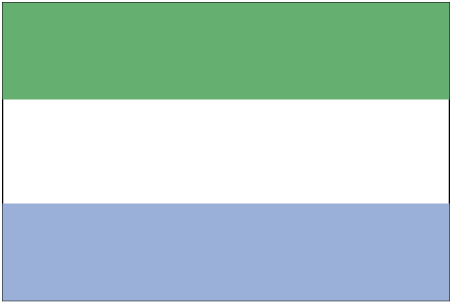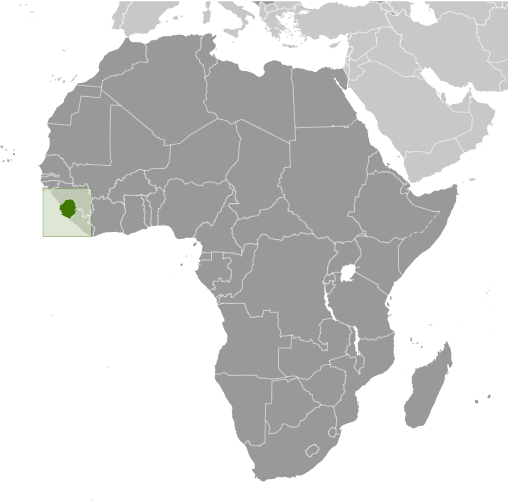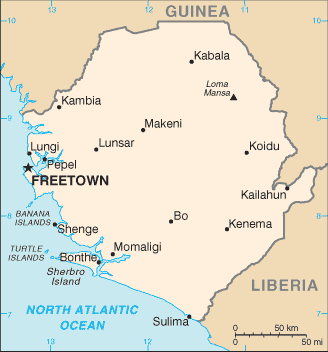Democracy is slowly being reestablished after the civil war from 1991 to 2002 that resulted in tens of thousands of deaths and the displacement of more than 2 million people (about one-third of the population). The military, which took over full responsibility for security following the departure of UN peacekeepers at the end of 2005, is increasingly developing as a guarantor of the country's stability. The armed forces remained on the sideline during the 2007 presidential election, but still look to the UN Integrated Office in Sierra Leone (UNIOSIL) - a civilian UN mission - to support efforts to consolidate peace. The new government's priorities include furthering development, creating jobs, and stamping out endemic corruption.
Population
5,245,695 (July 2010 est.)
Country comparison to the world:113
Nationality
Noun:Sierra Leonean(s)
Adjective:Sierra Leonean
Ethnic groups
20 African ethnic groups 90% (Temne 30%, Mende 30%, other 30%), Creole (Krio) 10% (descendants of freed Jamaican slaves who were settled in the Freetown area in the late-18th century), refugees from Liberia's recent civil war, small numbers of Europeans, Lebanese, Pakistanis, and Indians
Religions
Muslim 60%, Christian 10%, indigenous beliefs 30%
Languages
English (official, regular use limited to literate minority), Mende (principal vernacular in the south), Temne (principal vernacular in the north), Krio (English-based Creole, spoken by the descendants of freed Jamaican slaves who were settled in the Freetown area, a lingua franca and a first language for 10% of the population but understood by 95%)
Country Name
Conventional long form:Republic of Sierra Leone
Conventional short form:Sierra Leone
Local long form:Republic of Sierra Leone
Local short form:Sierra Leone
Government Type
constitutional democracy
Capital
Name:Freetown
Geographic coordinates: 8 30 N, 13 15 W
Time difference:UTC 0 (5 hours ahead of Washington, DC during Standard Time)
Administrative divisions
3 provinces and 1 area*; Eastern, Northern, Southern, Western*
Independence
27 April 1961 (from the UK)
National Holiday
Independence Day, 27 April (1961)
Constitution
1 October 1991; amended several times
Legal system
based on English law and customary laws indigenous to local tribes; has not accepted compulsory ICJ jurisdiction
Suffrage
18 years of age; universal
Executive branch
Chief of state:President Ernest Bai KOROMA (since 17 September 2007); note - the president is both the chief of state and head of government
Head of government:President Ernest Bai KOROMA (since 17 September 2007)
Cabinet:Ministers of State appointed by the president with the approval of the House of Representatives; the cabinet is responsible to the president
(For more information visit the World Leaders website)
Elections:president elected by popular vote for a five-year term (eligible for a second term); election last held on 11 August 2007 and 8 September 2007 (next to be held in 2012)
Election results:second round results; percent of vote - Ernest Bai KOROMA 54.6%, Solomon BEREWA 45.4%
Legislative branch
unicameral Parliament (124 seats; 112 members elected by popular vote, 12 filled by paramount chiefs elected in separate elections; members to serve five-year terms)
Elections:last held on 11 August 2007 (next to be held in 2012)
Election results:percent of vote by party - NA; seats by party - APC 59, SLPP 43, PMDC 10
Judicial branch
Supreme Court; Appeals Court; High Court
Political Parties and Leaders
All People's Congress or APC [Ernest Bai KOROMA]; Peace and Liberation Party or PLP [Darlington MORRISON]; People's Movement for Democratic Change or PMDC [Charles MARGAI]; Sierra Leone People's Party or SLPP [Solomon BEREWA]; numerous others
Political pressure groups and leaders
Other:student unions; trade unions
International organization participation
ACP, AfDB, AU, C, ECOWAS, FAO, G-77, IAEA, IBRD, ICAO, ICCt, ICRM, IDA, IDB, IFAD, IFC, IFRCS, ILO, IMF, IMO, Interpol, IOC, IOM, IPU, ISO (correspondent), ITU, ITUC, MIGA, NAM, OIC, OPCW, UN, UNAMID, UNCTAD, UNESCO, UNIDO, UNIFIL, UNMIS, UNMIT, UNWTO, UPU, WCO, WFTU, WHO, WIPO, WMO, WTO
Diplomatic representation in the US
Chief of mission:Ambassador Bockari Kortu STEVENS
Chancery:1701 19th Street NW, Washington, DC 20009
Telephone:[1] (202) 939-9261 through 9263
FAX:[1] (202) 483-1793
Diplomatic representation from the US
Chief of mission:Ambassador June Carter PERRY
Embassy:Southridge-Hill Station, Freetown
Mailing address:use embassy street address
Telephone:[232] (22) 515 000 or (76) 515 000
FAX:[232] (22) 515 355
Flag description
three equal horizontal bands of green (top), white, and blue; green symbolizes agriculture, mountains, and natural resources, white represents unity and justice, and blue the sea and the natural harbor in Freetown










